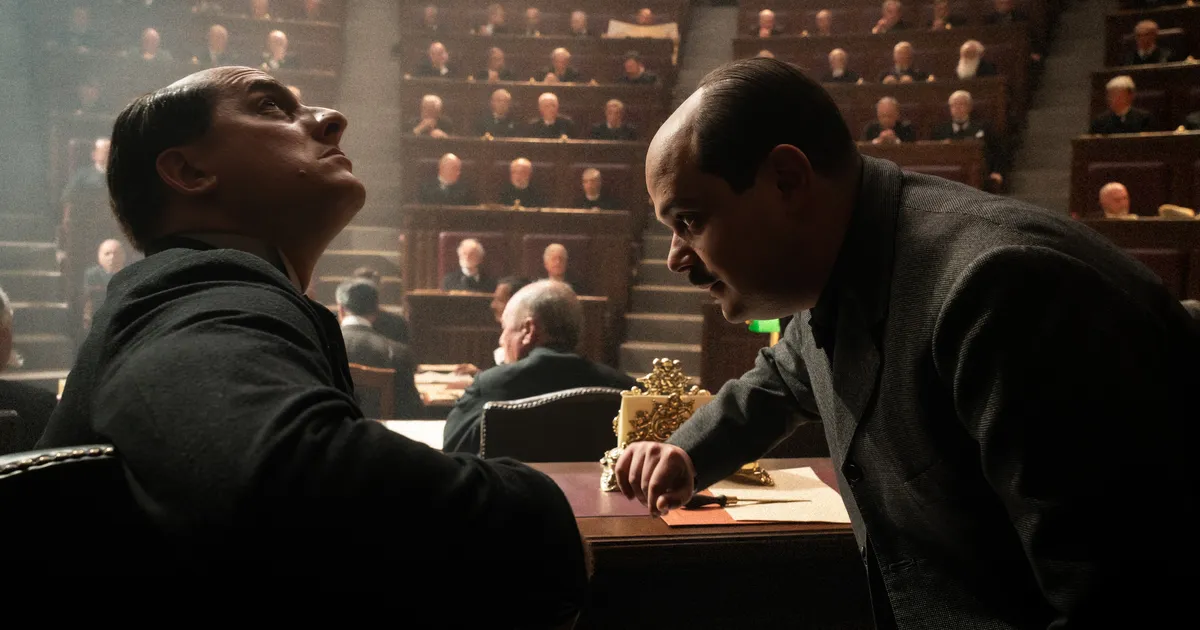
Spoilers follow for Italian history and the series Mussolini: Son of the Century through “Chapter 5,” which premiered on MUBI on Wednesday, October 1.
Give Joe Wright the opportunity to do whatever he wants, and he will do whatever he wants, like set his adaptation of Anna Karenina primarily in a rundown theater or have Blackbeard’s pirates sing Nirvana’s “Smells Like Teen Spirit” in Pan. Wright’s tendency as a director to point out the artifice of what he’s doing, then use our awareness of said artifice to emphasize how all of us, all the time, are performing for an audience, is a perfect fit for a story about politics and the people who wield ideologies as lure and cudgel. In Mussolini: Son of the Century, Wright has created a deliriously experimental series about a monstrous figure, jamming as many moving parts, camera tricks, and maximalist flourishes he can fit into the frame to demonstrate how the Italian dictator was such a magnetic, destructive force.
Mussolini is based on the 2018 novel of the same name by Italian author Antonio Scurati, the first in a five-part series about Benito Mussolini’s rise to power and two-decade reign. (The final book in Scurati’s pentalogy came out in April.) Wright’s adaptation covers the first book only, its eight episodes spanning 1914 to 1925, the years in which Mussolini struck out as a career socialist and pivoted to fascism. The latter was a failing movement at first, too, which the series emphasizes by speeding through a primer on Italian post–World War I history: Veterans of the war felt rejected by society, Italy’s king was ineffectual, and the gap was widening between the rich and military classes and the country’s farmers and peasants. In that gulf Mussolini saw an opportunity, which the series delivers in the premiere via its first bravura sequence of the man — Luca Marinelli, unrecognizable with a bald spot, paunch, and always-uncomfortable-looking posture — narrating directly to camera, “This is my time.”
As Mussolini walks toward the lens, pontificating and maintaining eye contact, Wright whips the camera around to show him assessing himself in a mirror before entering a room where veterans in uniform and draped with munitions cheer him on. These men were “brave soldiers … promised compensation, rewards” and “got nothing” except contempt from people who never wanted Italy in the conflict in the first place. Mussolini understands that their displacement (and ease with violence) allows him to present himself as a savior if they join the fascist cause. Through jingoistic language and a backslapping presence, Mussolini disguises himself as a man of the people, and their cries and applause harmonize with his bold claims about “My lost people, in need of strongmen and simple ideas … I will make the revolution with them!”
The room is shadowy but lively, with the sense that there are things going on in every speck of the frame. Mussolini stomps and swirls around, the camera keeping him and his increasingly frenzied supporters in sight. The sequence comes into focus as Mussolini ends up behind a projector and spins a film reel — and we jump into what’s being projected, which is the speech we just saw him deliver. Fascism is the only thing that will save “the fatherland,” he proclaims, his message repeating in the room to give the spectators a double dose of what they want to hear. (Note the echoes of ICE’s current “Defend the homeland” slogan.) It’s an Ouroboros of a scene, emphasizing Mussolini watching himself make history to communicate how he recruited Italians to his cause and ensured the rising tide of fascism centered on his image.
Wright plays with that tension constantly, delivering rhythmic montages and complicated choreography to amplify how Mussolini pulled strings as he saw them — convincing the country’s rich and poor alike that he’s on their side or lambasting the king in one breath and sweet-talking him in the next. A sinewy electronic score from Tom Rowlands of the Chemical Brothers accompanies one of the series’ first instances of horrific violence, a fascist raid on a socialist newspaper as cops stand by. Strobe lights, spinning grenades, and spurting blood accompany the unts-unts-unts.
All of this muchness, in both form and content, adds to the series’s sense of timeliness. No political promise is too ludicrous if it convinces society’s fringes to throw their weight behind a candidate (ahem), and no violence against dissenters too brutal once it becomes normalized (ahem, ahem). Mussolini, Wright explains, was a rapist and womanizer obsessed with other men’s dick sizes and disinterested in his children, but he understood that the way to rule, at least for a while, was to never ask for permission but simply push the line of acceptability until there’s no path back to what once was. The bored little shrug Mussolini gives as he says, in a resigned deadpan, that “You have to violate what is inviolable … a crossed boundary is no longer a boundary,” is one of Marinelli’s finest physical moments, conveying the casualness with which the dictator threw off standards of decency. Marinelli is intensely, unsettlingly charismatic, so much so that you marvel at his performance while hating basically every single thing his Mussolini says and does.
The series wants us to judge both the man spewing all this nonsense and the people, including his paramilitary Blackshirts, lapping it up — to consider why fear and cruelty so profoundly motivate in ways nothing else can. This feverish approach boils over in the final ten minutes of “Chapter 5,” which capture exactly how Mussolini’s breaking of the fourth wall and flaunted anachronisms underscore the grotesquerie of Il Duce’s beliefs and methods. The episode begins once Mussolini has been named prime minister after the fascists’ successful March on Rome in October 1922. As he reads from French, British, and American newspapers and official communiques praising him, Wright incorporates clips of soldiers and Blackshirts executing citizens and amps up the sound of the crowds chanting “Duce!” outside his offic. In previous episodes we’ve seen Mussolini batter and berate his wife, Rachele (Benedetta Cimatti); his mistress, Margherita (Barbara Chichiarelli); and his secretary, Bianca (Cosima Centurioni), and the opening minutes of the episode introduce Ida Dalser (Jessica Piccolo Valerani) — his first wife, whom he abandoned years before. She ambushes him to ask for support for their unacknowledged son, Benito Albino Mussolini, but fades into the background as Mussolini enacts his plans for Italy. He installs his loyalists in various ministry positions, takes over Parliament, formalizes a militia that is a “personal army financed by the state, that answers only to me,” recruits the Catholics with promises to put religion back in schools, and finally, delivers a speech to Parliament about how no one actually wants freedom.
Wright’s presentation of that anti-freedom speech is Mussolini at its wildest. Once again, numerous things are happening at once: As Mussolini stands to address Parliament, now fully on his side except for a few dozen socialists, Elvis Presley’s “Can’t Help Falling in Love” drops in. Mussolini spreads his arms wide as he asks, “Does freedom really exist? There are liberties, but freedom itself never existed,” and the camera cuts to his men breaking into Ida’s house and dragging her into an asylum. While Mussolini tells Parliament he’s not “some despot,” and Elvis warbles “Take my hand / Take my whole life, too,” we cut to doctors injecting Ida with a sedative and dragging her prone body behind cell doors that slam shut. Wright cuts back and forth frantically, exacerbating the sense that we’re watching something ungodly here, something so baseline evil that it can never be corrected.
The contradiction between Mussolini separating his first wife from her son while insisting paternalistically to elected officials that “this is the moment when Parliament and country can be reunited” is a distillation of Mussolini’s whole point: Fascists embolden deceit, destroy families, and ruin lives in pursuit of their own aggrandizement. In reality, Mussolini did refuse to support Ida and Benito Albino and ordered their surveillance. Both were institutionalized and died in asylums, her under mysterious circumstances, him at the age of 26. After this episode, Mussolini doesn’t return to these two, but it doesn’t have to. The sequence, with its jarringly melancholy musical choice and frenzied editing, conveys Mussolini’s personal and patriotic betrayals and dismantling of systems and relationships so devastatingly that the series doesn’t need to explicitly close the tragic loop.
After Mussolini ensures Ida is removed from public view, he goes home to grope his current wife, Rachele, and insist “the best days of our lives are ahead of us,” a mantra he repeats to placate her concerns about why they live in squalor when he’s the goddamned prime minister. Elsewhere, Mussolini’s goons beat to death a Catholic member of Parliament who refused to bend, the blood from his face and hands smearing the alley wall like stigmata. In the final moments, “Chapter 5” returns to Parliament so Mussolini can, after threatening the gathered representatives with death if they don’t vote for his new majority-rule electoral law, make his ultimate plan clear. From the center of the chamber, he says to camera, with a dismissive hand wave, “Democracy is beautiful. It gives you a lot of freedom, even the freedom to destroy it. When it’s done, we’ll abolish it.”
Presley’s “I can’t help falling in love with you” chorus continues playing over the episode’s final seconds, which reel through black-and-white footage of all the women Mussolini broke and abandoned. First Margherita, whom he tossed aside after she wrote his speeches, planned his strategies, and plotted his rise. Rachele, whom he regularly rapes and ultimately abandons to care for their children alone. And finally Ida, screaming in containment, cursed to die for the mistake of once caring for the man who probably killed her. This is sensorial bombardment, sights and sounds that shouldn’t work together, let alone in a series meant to connect the failures of our past with the nightmare of our present. But through this elaborate mash-up, Wright creates the off-kilter atmosphere necessary to underscore the danger at hand, the way people in power romanticize their own cruelty and spin hatred as love. It’s a lie, of course, and Mussolini: Son of the Century wants us to know it. The only thing a dictator loves is themselves.



